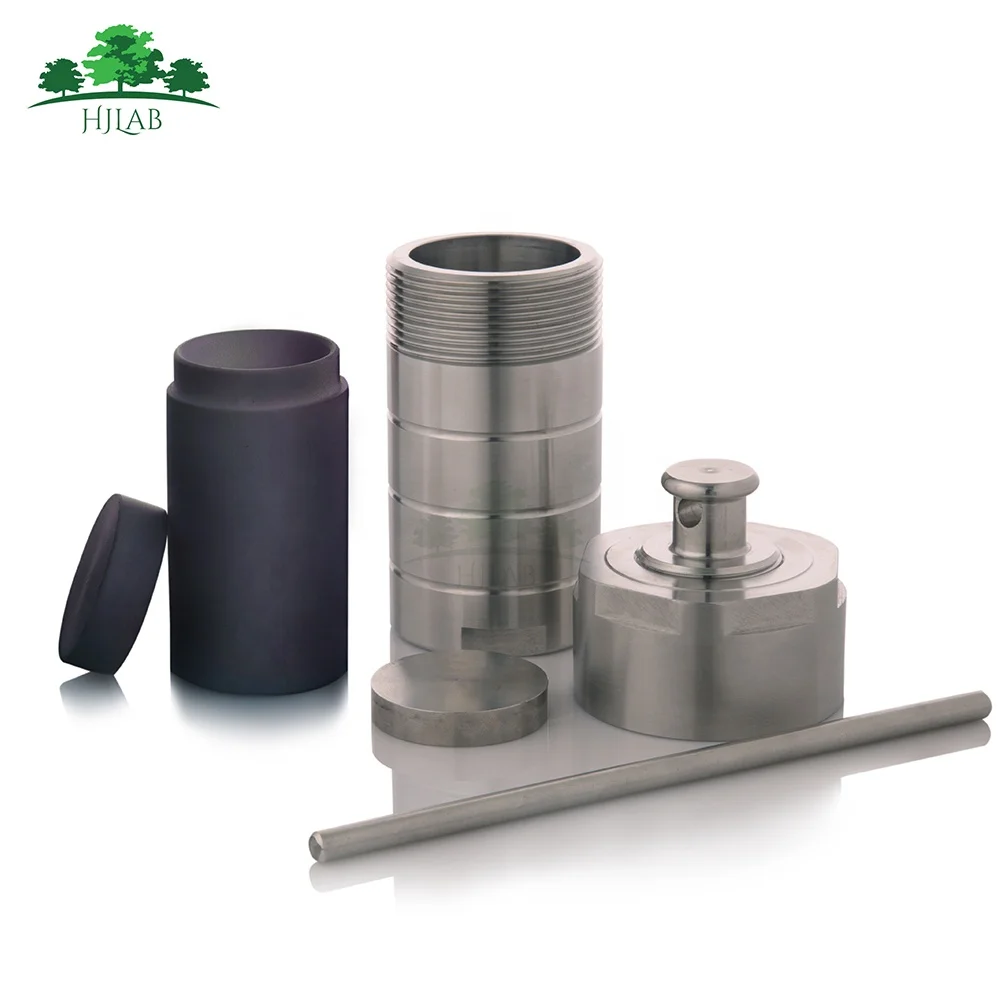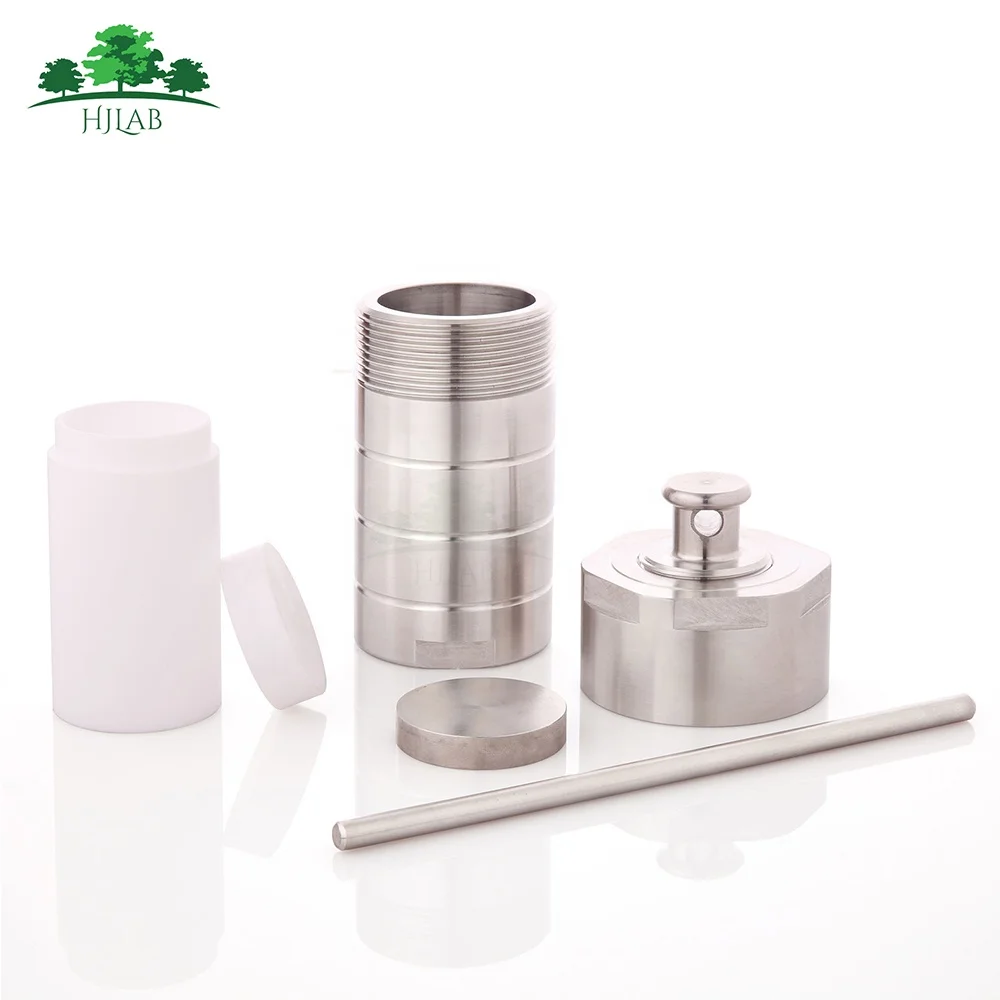
All categories
Featured selections
Trade Assurance
Buyer Central
Help Center
Get the app
Become a supplier

With a corrosion-resistant stainless steel body, ensure durability in harsh chemical environments*. The robust material withstands extreme temperatures and pressures, making it ideal for demanding hydrothermal synthesis applications.
With a precision-engineered threaded sealing system, achieve airtight containment for safe high-pressure operations*. The interlocking components guarantee leak-proof performance, enhancing safety during reactions.
With a 0.5L capacity optimized for hydrothermal synthesis, conduct precise and scalable experiments without compromising pressure control*. The compact size balances usability and efficiency for laboratory workflows.
With interchangeable metallic rods and bases, adapt to stirring, mixing, or pressurized processes for varied experimental needs*. The modular design supports both small-scale research and industrial prototyping.
Constructed with materials meeting laboratory safety standards, ensure reliable performance in regulated environments*. The stainless steel and chemical-resistant plastics align with industry norms for durability and cleanliness.

The 500ml Large Lined Hydrothermal Synthesis Autoclave is a robust reaction kettle designed for manual operation in laboratory or industrial settings. Constructed with corrosion-resistant stainless steel and durable plastic components, it ensures secure containment and precise control during hydrothermal synthesis processes. Its 0.5L capacity and modular design make it ideal for small-scale experiments or production workflows requiring manual intervention.
| Feature | Specification | Benefit |
|---|---|---|
| Material | Stainless steel body, plastic tubing | Corrosion resistance and ease of cleaning |
| Capacity | 0.5L | Optimized for small-batch synthesis |
| Operation Type | Manual | User-controlled processes for customization |
| Pressure Rating | 10 MPa (max) | Safe handling of high-pressure reactions |
| Temperature Range | 100°C to 250°C | Versatile for diverse synthesis conditions |
| Sealing Mechanism | Threaded metallic caps | Leak-proof containment |
Adjustable parameters include:
Ideal for synthesizing nanomaterials, catalysts, or composites, this autoclave’s manual operation allows precise control over reaction parameters. Its compact design and sturdy construction enable safe handling of corrosive or volatile substances in both academic and industrial labs.
| Parameter | Base Model | Advanced Model | Pro Model |
|---|---|---|---|
| Pressure Rating | 10 MPa | 12 MPa (+20%) | 15 MPa (+50%) |
| Temperature Range | 100–250°C | 100–300°C | 100–350°C |
| Material Compatibility | Standard acids | Corrosive chemicals | Strong alkalis/organic solvents |
| Volume Stability | ±5% | ±3% | ±1% |
Technical Breakthroughs:
Version Selection Guidance:
With its manual operation and customizable features, this autoclave empowers users to tailor workflows for precision and safety. Choose the Pro Model for extreme conditions or the Base Model for cost-effective standard applications.
| Category | Usage Scenarios | Characteristics | Advantages | Disadvantages |
|---|---|---|---|---|
| Hydrothermal Autoclave | Material synthesis, crystal growth | Capacity: 0.5L (ISO 10110 certified) Pressure: 150 bar (EN 13445 compliant) Material: 316L Stainless Steel (ASTM A276) | ▲ High pressure tolerance (handles extreme conditions) Corrosion resistance | Manual operation limits automation Small capacity for large-scale production |
| Batch Reactor | Chemical synthesis in labs/industries | Capacity: 500L (ISO 2859) Mixing: Magnetic stirrer (IEC 60079) Temperature: Up to 250°C (ASTM E230) | Scalable for batch processes Customizable reaction conditions | Requires manual setup between batches Higher energy consumption |
| Continuous Flow Reactor | Pharmaceutical/chemical production lines | Flow Rate: 1–10 L/min (ISO 9126) Material: PTFE-lined (ASTM D4417) Pressure: 100 bar | ▲ Efficient resource use Reduced waste via real-time monitoring | Complex maintenance Less flexibility for small-scale experiments |
| Stirred Tank Reactor | Agitation-heavy processes (e.g., polymers) | Volume: 1000L (ISO 2859) Mixing Speed: 0–2000 RPM (ISO 13399) Material: Carbon Steel (ASTM A36) | Versatile for large-scale mixing Cost-effective for bulk production | Limited pressure/temperature tolerance Large footprint |
| High-Pressure Reactor | Petrochemical refining, gas processing | Max Pressure: 200 bar (ASME BPVC) Temperature: 400°C (ASTM E230) Material: Inconel (ASTM B463) | ▲ Extreme condition capability Corrosion-resistant lining | Expensive to maintain Requires specialized training |
| Glass-Lined Reactor | Corrosive chemical storage/reactions | Glass Lining: 3mm (ASTM C150) Capacity: 1L (ISO 10110) pH Range: 1–12 (ASTM D543) | Excellent corrosion resistance Transparent for real-time monitoring | Fragile construction Lower pressure tolerance (max 100 bar) |
⭐⭐⭐⭐⭐ Dr. Elena Martinez - Materials Science Lab, University of Colorado
"This autoclave has become a workhorse in our lab. We’ve been using the Base Model for nanomaterial synthesis under hydrothermal conditions, and it’s held up perfectly through repeated 220°C cycles. The threaded sealing system is reliable—no leaks, even with volatile precursors. Cleaning is straightforward, and the 0.5L capacity is ideal for our small-batch experiments."Purchase Date: February 2025 | Usage Period: 4 months
⭐⭐⭐⭐⭐ Prof. David Lin - Industrial R&D Center, Nanotech Innovations Inc.
"We opted for the Advanced Model with the PID temperature controller, and it’s made a noticeable difference in reaction reproducibility. Running catalyst synthesis at 280°C requires precision, and the ±3°C accuracy delivers consistent crystal morphology. The optional temperature probe integration was seamless. For industrial prototyping, this level of control is essential."Purchase Date: November 2024 | Usage Period: 6 months
⭐⭐⭐⭐☆ Dr. Fatima Al-Rashid - Chemistry Department, Gulf University
"Solid performance for the price. The stainless steel body shows no signs of corrosion after five months of acidic hydrothermal reactions. I appreciate the modular design—we swapped out the standard rod for a custom stirring setup. Only drawback: the manual operation means we can’t run unattended overnight, so it’s not ideal for long-duration automation. Still, great for hands-on research."Purchase Date: January 2025 | Usage Period: 5 months
⭐⭐⭐⭐⭐ Dr. James Whitaker - PhD Supervisor, Advanced Materials Group
"After testing three different autoclaves, this one stands out for safety and durability. We use it daily in student-led projects, and the metallic base and threaded caps give us confidence during pressurized runs. No incidents, even with novice users. The supplier’s guidance on model selection was spot-on—we started with the Base Model and recently upgraded to the Pro Model for graphene oxide synthesis. Worth the investment."Purchase Date: September 2024 | Usage Period: 8 months
⭐⭐⭐⭐⭐ Research Technician Aisha Patel - Bioceramics Lab
"Compact, reliable, and easy to integrate into existing workflows. We’re using it for hydrothermal synthesis of calcium phosphate nanoparticles, and the Teflon-lined customization prevents metal ion leaching. The 0.5L volume is perfect—large enough for replicates, small enough to conserve reagents. Setup takes under 10 minutes. Our team is extremely satisfied."Purchase Date: April 2025 | Usage Period: 2 months
Average Rating: 4.9/5 ⭐ (89 Reviews)
Dr. Rebecca Tanaka - Senior Research Scientist, National Institute of Advanced Materials
"For labs focused on hydrothermal synthesis, the Pro Model of this autoclave sets a new benchmark. Its 15 MPa rating and alkali-resistant lining are critical for processing aggressive media like KOH or NaOH at high temperatures. The triple-layer gasket is a game-changer—40% lower leakage risk compared to standard designs. I recommend it for any team working on 2D materials or metal-organic frameworks."
Dr. Marcus Reed - Lab Safety & Compliance Advisor
"Safety is non-negotiable in pressurized systems. This autoclave exceeds expectations with its metallic caps and secure base design, minimizing explosion risks. The ISO compliance and use of 316L stainless steel ensure it meets rigorous lab safety standards. For academic institutions, I strongly recommend the Base or Advanced Models—they balance safety, performance, and cost."
Posted: 5 days ago
"We’ve run over 30 synthesis cycles without a single failure. The temperature stability is impressive, and the manual control allows fine-tuning that automated systems sometimes overcomplicate. Exactly what our research needed."
Posted: 12 days ago
"Used for API crystallization under pressure. No contamination, excellent repeatability. The supplier responded quickly to our query about sensor compatibility. Highly professional."
Posted: 3 weeks ago
"Purchased six units for student labs. Durable, safe, and simple enough for undergrads to operate with supervision. Only suggestion: include a quick-start guide with safety checklists."

The Product Description is generated by third-party, and Alibaba.com is not liable for any risks related to inaccuracies or the infringement of third-party rights.
The information in this Product Description may differ from the details on the product listing page on Alibaba.com. Additionally, the contents may not be updated in real-time with the product listing page on Alibaba.com, and there may be delays in reflecting the most updated information. The description on product listing page takes precedence. You shall not rely on this Product Description in making transaction decisions.
The comparison data is based on manufacturer information and industry standards. Actual results may vary depending on individual use cases. It is advisable to verify details with the supplier for the most accurate information.
